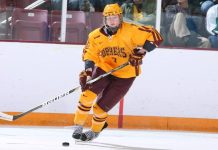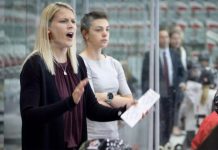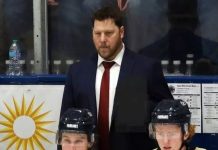In a deviation from its original policy, the NCAA will allow University of North Dakota athletes to wear uniforms adorned with the Fighting Sioux name and logo during NCAA-sponsored playoff events — at least until Feb. 1 next year.
Last Friday, UND filed a second appeal for review by the NCAA Executive Committee, the same body that on Aug. 5 implemented a policy against “hostile and abusive” American Indian nicknames, mascots and imagery. The policy penalized UND and 17 other schools and included an immediate ban on uniforms with Indian-related names or imagery during NCAA-sponsored post-season events.
“The NCAA told us we didn’t have to stop,” said Phil Harmeson, senior associate to UND president Charles Kupchella. “We have a letter from the NCAA Championships Committee saying that we do not have to modify our uniforms.”
This means that during the coming weekend, UND’s Division II men’s football and women’s soccer teams can compete in NCAA playoff games without being in violation of the policy while wearing their standard uniforms.
Since the NCAA issued the policy, three schools have been exempted from it, two have agreed to change their names and three — including UND — have had their initial appeals denied. UND filed its first appeal on Aug. 30 and was turned down on Sept. 28 by an NCAA staff review committee.
In UND’s second appeal, Kupchella said even though the policy enacted by the committee was “undoubtedly well-intentioned,” it was wrong, deeply flawed and should be withdrawn because it’s “inconsistent with the NCAA’s Constitution, rules, and regulations and based on vague and arbitrary standards.”
The appeal claims that UND has the approval of the Spirit Lake Nation to use the Sioux name, which was granted in a resolution passed by the tribal council in December 2000. That support has not been withdrawn, Harmeson said.
In granting appeals to Florida State University (Seminoles), the University of Utah (Utes) and Central Michigan University (Chippewa), the NCAA cited the permission of a “namesake sovereign tribe” to use such nicknames as a key factor in granting those schools exemptions from the policy.
However, in denying UND’s appeal, the NCAA said the university didn’t have approval from any of the three Sioux tribes in North Dakota. Kupchella argues that not only does UND have tribal approval, but also that the NCAA applied a different standard to UND than it did to FSU, Utah and CMU.
“The NCAA made multiple attempts to contact the Spirit Lake Nation,” Harmeson said. “All of them went unheeded. Those contacts went toward getting the answer the NCAA wanted rather than what the answer really was.
“The Spirit Lake Nation’s resolution meant nothing in relation to what the NCAA ultimately did,” he said. “One can only wonder what signal was sent to the tribe, that their resolution was irrelevant.”
Other points made in UND’s second appeal are that:
• UND has the “legal and moral right to use the nickname” — so long as it’s done respectfully.
• The NCAA has “dramatically overstepped” its constitutional authority by moving beyond the “basic athletic issues” it was created to address and into social and political issues best dealt with at the local level.
• By misusing its “monopoly power,” the NCAA has created “a serious breach of the public trust.”
• The university’s relationship with tribes in North Dakota is far more substantive than the “special relationships” the NCAA cited in granting exemptions to FSU, Utah and CMU.
• The NCAA has failed to define a legal standard for “hostile and abusive,” making it difficult to form the basis for an appeal.
• The NCAA has inappropriately granted its authority to a third party to change UND’s nickname, authority that lies with North Dakota’s State Board of Higher Education.
Kupchella invited members of the NCAA Executive Committee to UND for a site visit so that they could see for themselves what’s happening at the university. Harmeson said there’s been no response to the invitation. Regular dialogue on the nickname and other issues is continuing with tribal leaders in North Dakota, he said.
If the Executive Committee denies UND’s second appeal, the third and final step of the process would be an appeal to the NCAA Division II Presidents Council.
UND’s latest appeal mentions the possibility of legal action if the NCAA refuses to exempt the university from its policy. Recent news accounts quoted noted sports law experts at Duke and Marquette universities as saying that UND stood little chance of winning a court case against the NCAA.
Harmeson, who holds a law degree and serves as UND’s faculty athletic representative to the NCAA, said the university will not rule out that option.
“We would not consider heading down that trail if we did not feel that we had a reasonable chance of prevailing,” he said. “We’ve had many offers of assistance, not only from very good attorneys, but also offers to begin a legal fund to take care of whatever it might cost to litigate the matter.”
One legal avenue UND might pursue is suing the NCAA for breach of contract, Harmeson said.
“When we entered into the agreement to become a member of the NCAA, we knew what the requirements were at the time we contracted,” he said. “Clearly, there’s an attempt to change that without mutual consent.”
Tom Buning, UND athletic director, said the uniform ban could become a problem again in the spring if the university’s hockey or basketball teams make it into the NCAA post-season playoffs. Given that UND is still in the appeals process and that it takes at least six months to receive new uniforms, he said it would be nearly impossible to get them in time for spring playoff games.


